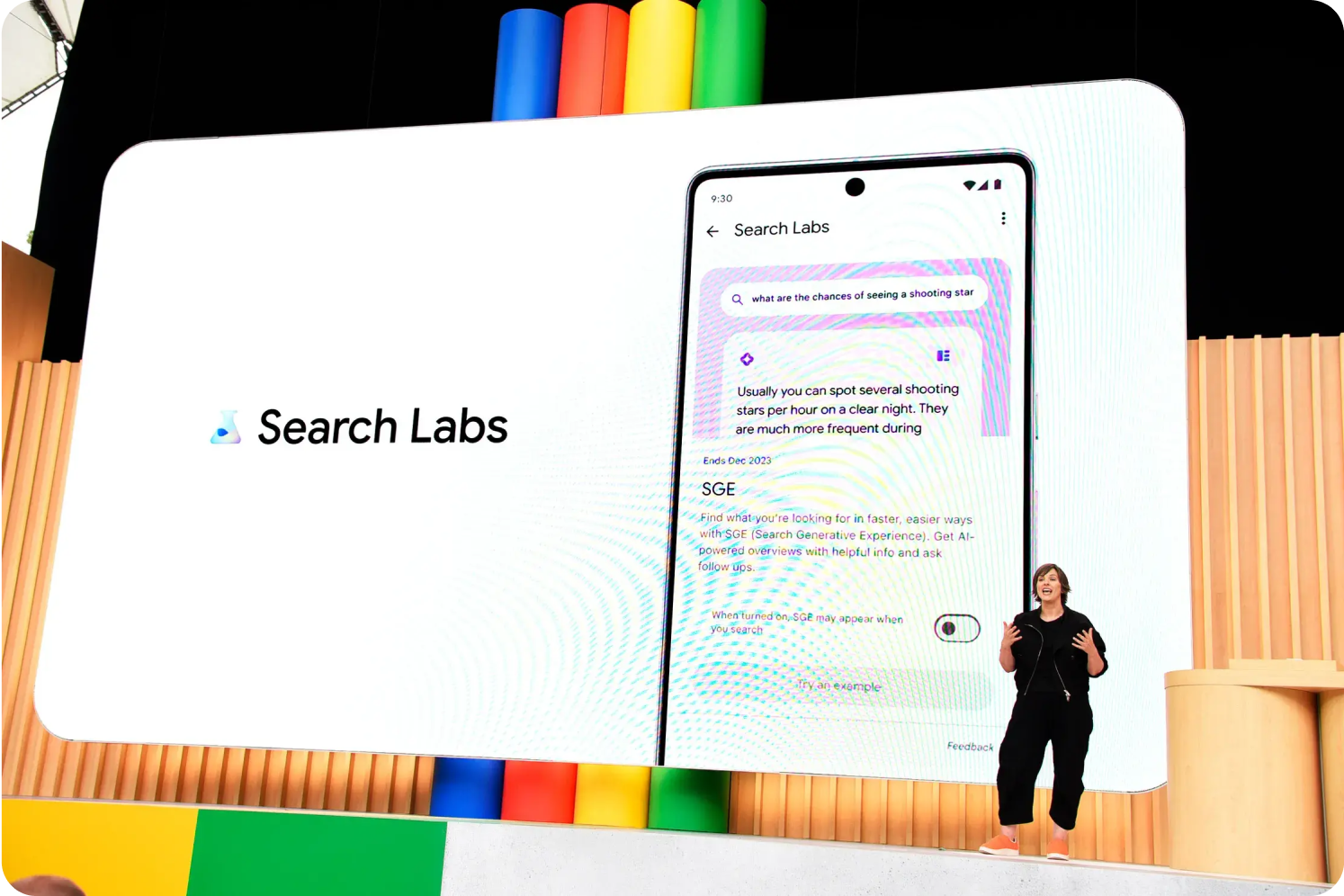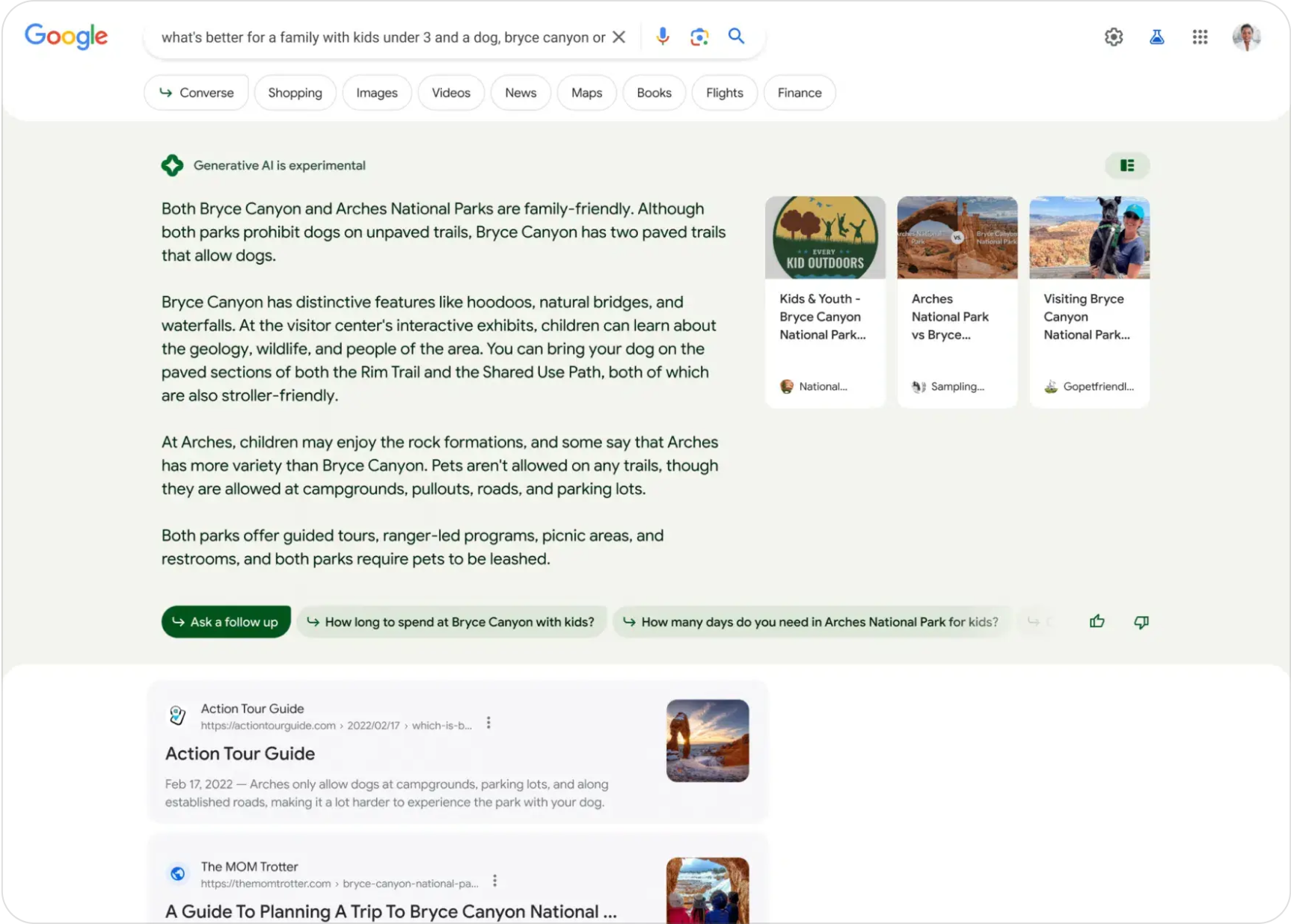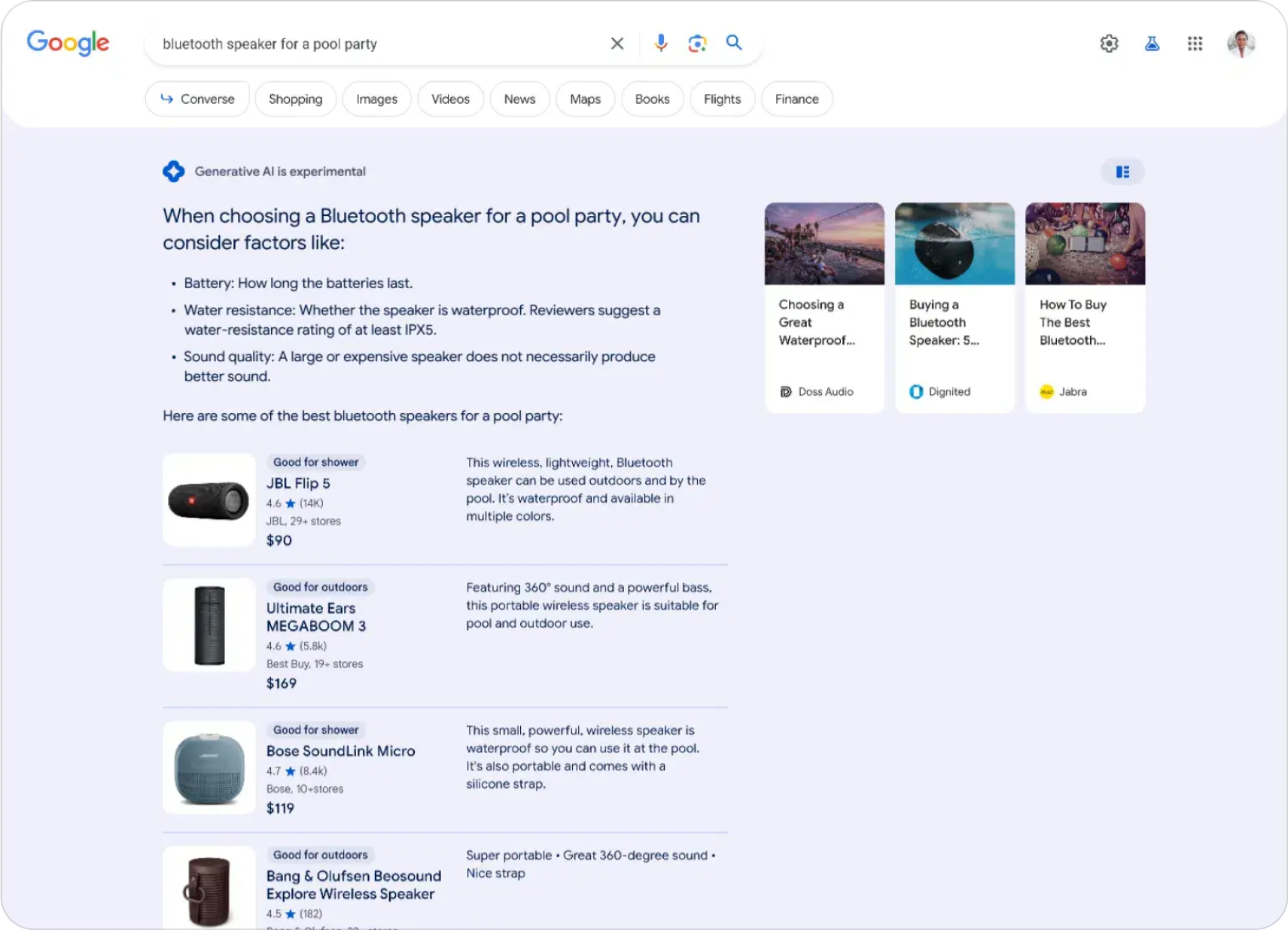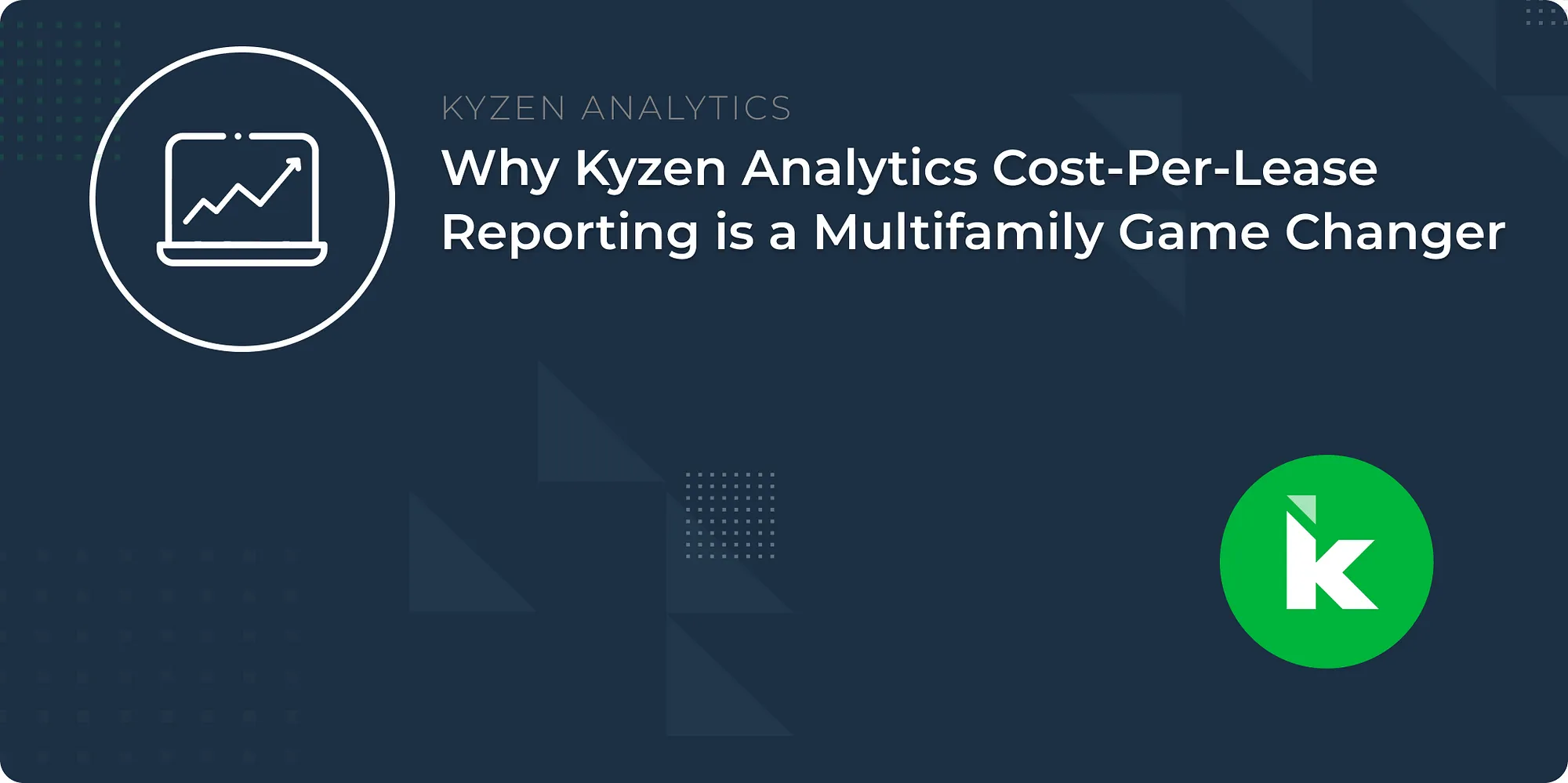Embracing the Future: How Google's SGE Shapes SEO for Multifamily
 Recently, a new hot topic in the world of Google and search engine
marketing has emerged. Google has announced that its search engines will
utilize generative AI, also known as Google Search Generative Experience
(SGE), to provide more AI-powered answers to search queries. Google
introduced SGE to its initial beta testers just before Memorial Day in
2023 via its "Search Labs." It is expected to be fully rolled out
sometime in 2024.
Recently, a new hot topic in the world of Google and search engine
marketing has emerged. Google has announced that its search engines will
utilize generative AI, also known as Google Search Generative Experience
(SGE), to provide more AI-powered answers to search queries. Google
introduced SGE to its initial beta testers just before Memorial Day in
2023 via its "Search Labs." It is expected to be fully rolled out
sometime in 2024.
What is Google's Search Generative Experience (SGE)?
Google is leveraging generative AI through its Google Search Generative Experience (SGE) to enhance search results. SGE uses natural language processing (NLP) capabilities to understand complex topics and better understand detailed search queries. SGE provides users with quick overviews of search topics without clicking on individual web pages. This AI-driven summarization can assist users in finding answers, summarizing key takeaways, and obtaining how-to instructions efficiently.

An example of a search with AI Overview. (Image: Google) (Google)
In addition to the quick overview summaries that SGE is currently primarily used for, it has to be assumed that Google will continue to utilize AI to help determine the best results to display for all types of search queries.
Just recently, in May 2024, at its Google I/O developer conference, Google announced it is also working on answering more complex questions via an update in Search Labs.
They gave an example of being able to search for a yoga or Pilates studio in Boston that is offering discounts to new members and is close to Beacon Hill. Search will provide an answer without you having to perform multiple searches.
To reframe that for multifamily, consider the possibilities for someone searching for "an apartment with move-in specials near Memorial Hospital in Hollywood, FL."
It's early days, but this is the beginning of a huge shift in how Google ranks and displays results.
With the rise of ChatGPT and the rumors that it could be developing its own AI-based search engine, Google seems motivated to stay ahead of the competition and maintain its dominant market share lead (estimated to be 91% of the search market).
Ways to Win With Generative AI
Below are some thoughts and potential strategies that can help you think about how to approach Generative AI for Search. Here at Dyverse, we don't see the need for any drastic changes; it just shifts in how you think about how the search engines work and how your content can be rewarded by embracing these changes. Here are some concepts to keep in mind.
Developing Websites with More Knowledge Depth - The rise of Generative AI in search could mean organic search results will lean more heavily on rewarding the building of topical authority and thought leadership. Based on that direction, seeing how smaller community websites can compete for organic search rankings with larger ILS and corporate property management portfolio websites will be interesting. The older and deeper your website is, the more opportunities you have to develop topical authority.
In other industries outside of multifamily, such as hotels and apparel, Google can also serve up individual product results by utilizing SGE. Google has still yet to indicate when or if it will ever showcase individual apartment units through its organic or paid search results. Still, we recommend preparing your apartment community website to have a dedicated place to detail all FAQs, features, amenities, units, floor plans, virtual tours, and more. This is a good strategy for providing Google and other search indexers with the information and assets they need to answer any question using its AI technology.

An example of a search with AI Overview. (Image: Google) (Google)
Focus On Long-Tail Keywords - SGE encourages detailed queries rather than short phrases. Optimize your content for long-tail keywords. For example, instead of just targeting “apartments in Boston,” opt for also targeting longer phrases such as "best apartments to have a medium-size dog in Boston."
Prioritize Natural Language - Like ChatGPT, Google's SGE understands everyday language, so we recommend using natural, conversational language in your content. Again, focus on the user experience instead of just stuffing your web pages with keywords. This also helps with voice search optimization, which continues to grow in usage.
Implement Structured Data - Structured data (schema markup) helps search engines understand and categorize content. Utilizing structured data makes your content more accessible to search engines, improving your SEO performance over time.
Implement Google Search Console - Make sure to take the steps to set up a Google Search Console account to be able to identify any issues with Google being able to crawl your website. Google Search Console is also an effective way of monitoring traffic to specific website pages and the search queries that generate the traffic. You can view this reporting in Google Search Console and connect it to GA4 and other marketing reporting tools such as Kyzen Analytics.
The Best Move For Now
It’s too early to gauge the full impact of SGE on SEO, especially in specific sectors like multifamily housing, as the SGE pilot is still in beta and not universally available. Additionally, traditional search results are still available below the AI-generated responses, and only users who opt-in to use SGE will see these AI-generated results. Many users still rely on traditional search methods.
With all the updates, the core principle remains: SEO content should focus on user experience. SEO on-site fundamentals, quality blog posts, detailed descriptions of community features, units, floor plans, offers, and frequently asked questions can help improve rankings for both Generative AI and traditional search results.
Continue optimizing your site for SEO as usual. Use tools to monitor and improve your rankings, and focus on creating helpful content in natural language that meets search intent. You can contact Dyverse to discuss solutions like our Syndicate organic media offering, which helps develop and share content across your website and social media channels. By staying adaptable and focusing on user experience, your SEO strategy can thrive even in the era of Generative AI. Please contact us for further guidance on adapting your SEO strategy to leverage Google's SGE or to learn more about our services. Together, we can ensure that your community keeps up with the digital curve and stands out in the crowded online marketplace.
More from Dyverse

What’s Coming to Kyzen? Enhanced Portfolio Reporting and More.
As a company, we’re constantly striving to enhance our products, services, and business practices. Our Kyzen Analytics software is named...
Want more?
Subscribe to get the latest updates on multifamily marketing, technology, and more.
Keep up with us!
For the latest updates be sure to connect with us on our social platforms.
Let's start a conversation
Schedule a demo to discuss how Dyverse can help you boost your leasing performance.




